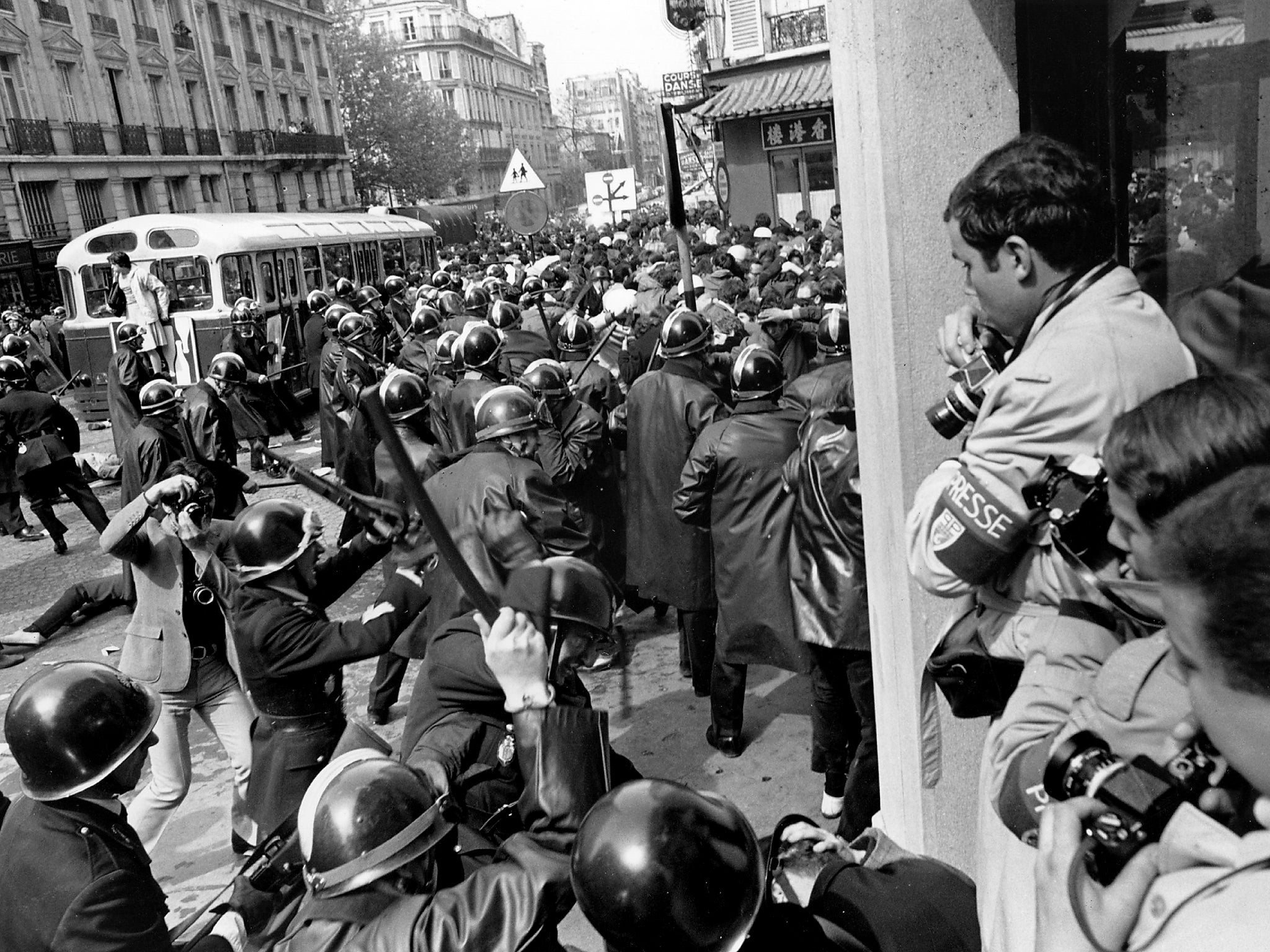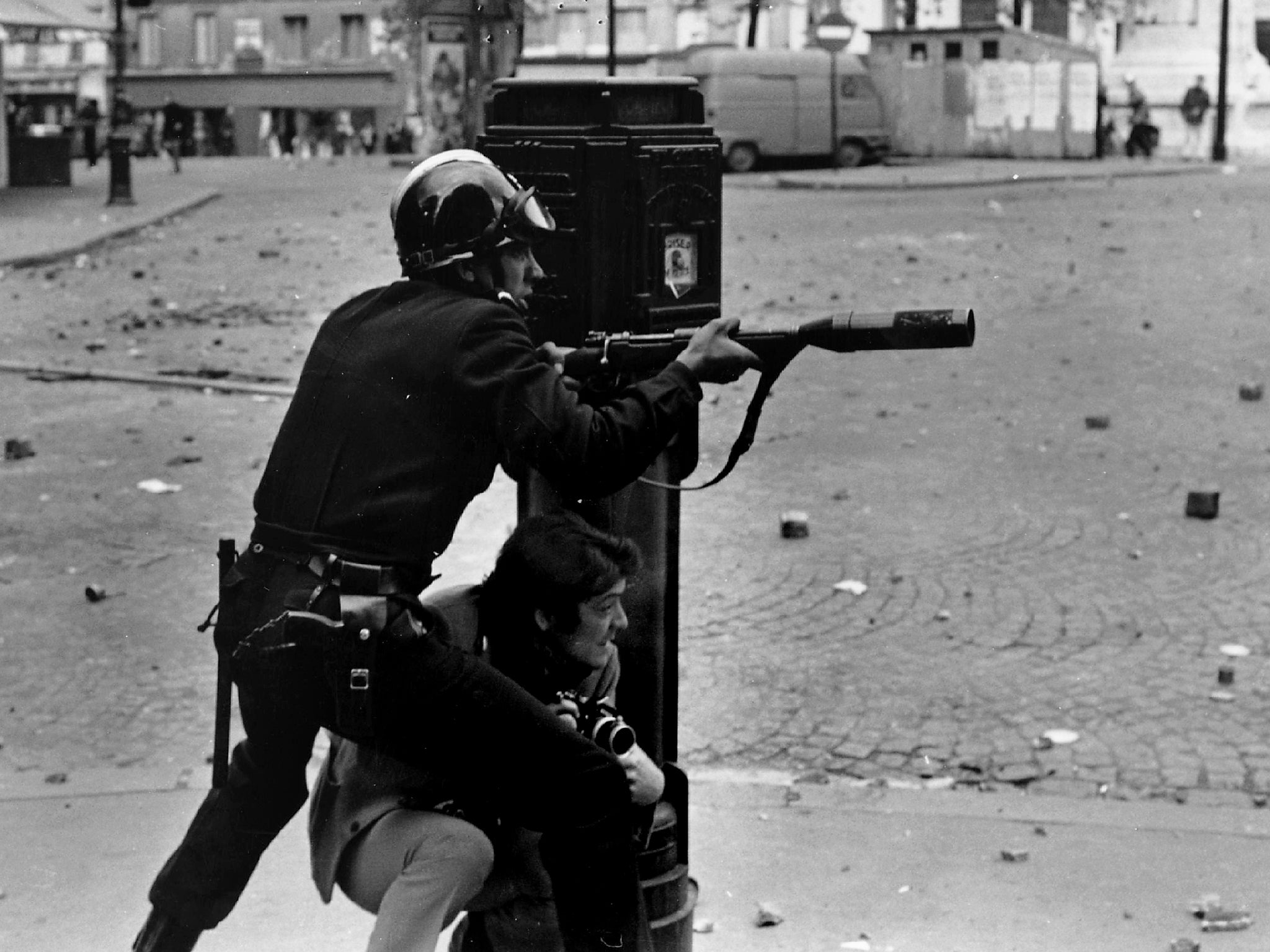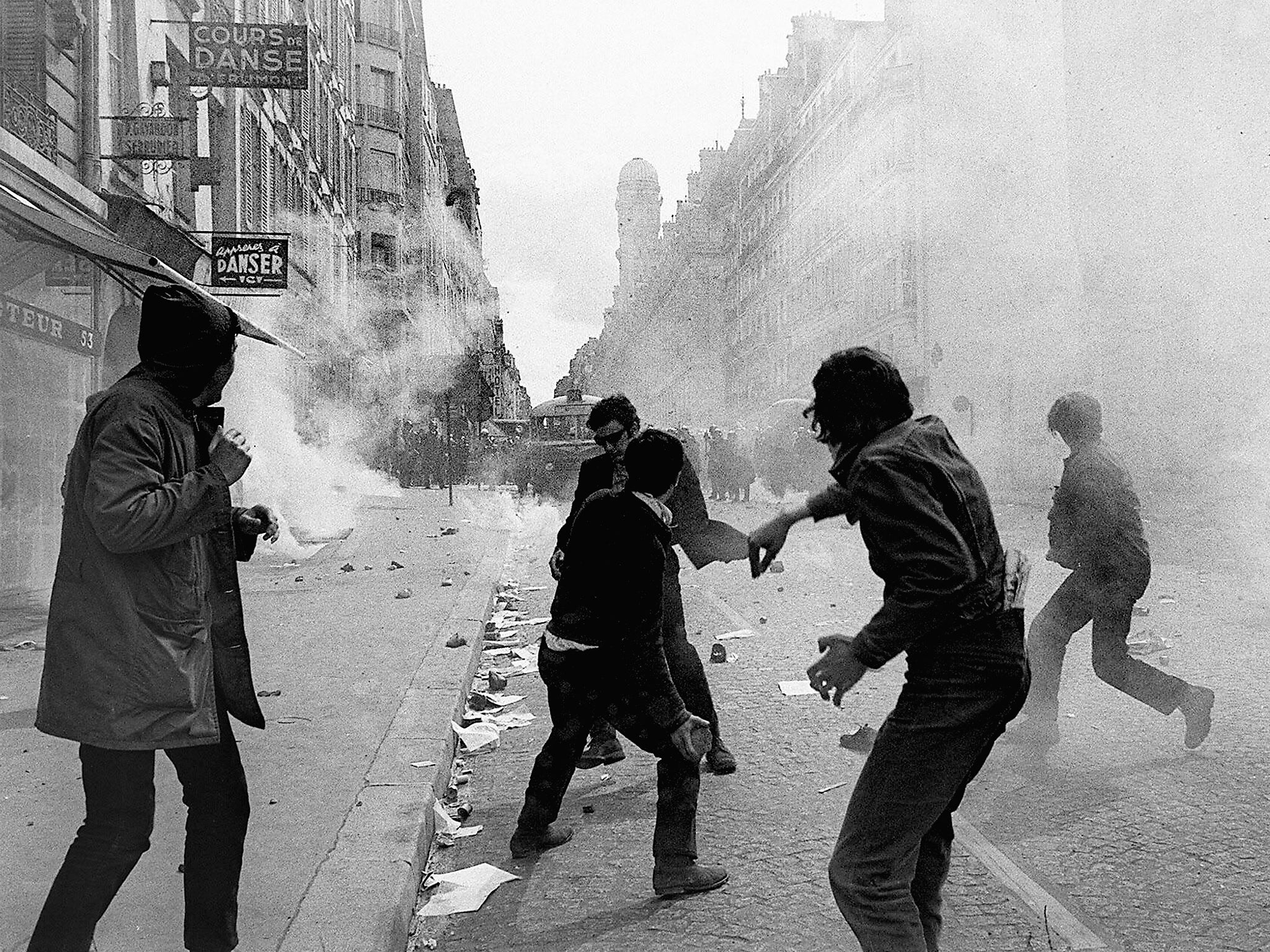One night in Brooklyn: how US philosophers are processing truth and reality in the age of Trump
On a visit to New York, Andy Martin finds febrile philosophising reminiscent of Paris in ’68, as intellectuals try to process Trumpian reality. Is a war brewing in America between the contemplatives and the contemptible?

Your support helps us to tell the story
From reproductive rights to climate change to Big Tech, The Independent is on the ground when the story is developing. Whether it's investigating the financials of Elon Musk's pro-Trump PAC or producing our latest documentary, 'The A Word', which shines a light on the American women fighting for reproductive rights, we know how important it is to parse out the facts from the messaging.
At such a critical moment in US history, we need reporters on the ground. Your donation allows us to keep sending journalists to speak to both sides of the story.
The Independent is trusted by Americans across the entire political spectrum. And unlike many other quality news outlets, we choose not to lock Americans out of our reporting and analysis with paywalls. We believe quality journalism should be available to everyone, paid for by those who can afford it.
Your support makes all the difference.His name was Roland. He was a Maoist who played the double-bass and listened to Miles Davis and I was in love with his wife. Only partly, on account of her suicidal tendencies. In 1968 when I got to know him (it might be helpful to mention that I was very young at the time) in Paris, he had recently been burning cars and tossing paving stones at the riot police. He taught me the word flic (I think the slogan was “A bas les flics!”, “Down with the police” or possibly “pigs” in the idiom of the time). This was the era of the so-called Événements or “Happenings”. Oddly enough Roland went straight from revolutionary to juvenile judge, I recall.
I was reminded of him the other day in Brooklyn. Or should I say night? Because it was the “Night of Philosophy & Ideas” at the Brooklyn Public Library. Running from 7pm last Saturday to 7am on Sunday. Seriously, it really happened. I know, I was there. I do not go around making stuff up randomly on the spur of the moment. Unlike some. And this was the whole gist of those 12 heady, subversive hours. What are we going to do when a fabulist, a spieler, a spinner of yarns with his finger on the button of total unreality has taken over the White House? There were no blazing cars or Molotov cocktails. Not yet anyway. But there was a feeling of a nation – or at least a city – on fire that I haven’t felt since ’68. Post-truth Trumplandia is heaven for activists. Norman Mailer spoke of “the armies of the night” in the period of the Vietnam protests and it seems as if they are on the march again. Some kind of civil war is brewing in America: between the contemplatives and the contemptible.
I took a properly philosophical attitude and turned up hours later than planned.

Skye Cleary, a neo-existentialist at Columbia was giving a paper on “Polyamory” at 1.30am and I said I would be there for sure. I thought she might need some support. A 1.30 am? If there were three people in the audience she’d be lucky! I could go along and swell the ranks.
It was all basically Jonathan’s fault. Jonathan is a lawyer. We were having dinner at Westville on Hudson and he was fielding calls from people who wanted to know if there was some amendment in the constitution that would enable them to do something about the President. Impeach him maybe. This was immediately after a judge had rescinded or put a “stay” on the latest executive order to come out of the White House, pledging to torture the language still further and forbidding abortion, unless you had in fact already been born and were then trying to get into the United States. The “Deferred Selective Termination” act or something similar. Give us your tired, your poor, your huddled masses and we will soon put them out of their misery, don’t worry.
Anyway so Jonathan was taking all these calls. And I was drinking, which I had vowed not to do. Then he drags me off to some shady bar in West Village and cracks open another bottle, so by the time I order some chamomile tea and sober up a bit and schlep all the way over to Brooklyn I’ve missed Skye’s paper and she’s already gone home. I also missed Bernard Stiegler talking about “Noesis and Exosomatization”. Damn. He’s a good speaker, Stiegler. And at least the “and” was in English.

There were people singing and dancing in the lobby of the Brooklyn Public Library, which I had never seen before. I went in search of the non-stop reading of Alain Badiou’s Plato’s Republic but somehow ended up in a room where they were showing a movie called Tokyo Reverse, which is all about a guy walking through Tokyo while everyone else is walking backwards. It has to be said it was curiously beguiling and the soundtrack was cool too. It was supposed to last for nine hours but for all I know it is still going. I see no reason for it to stop.
But the main Événements were taking place in the Languages & Literature auditorium. Which, to my astonishment, throughout the night, was packed. You couldn’t move for philosophers. I haven’t seen anything like it for almost half a century. Which is when I started having flashbacks to 1968. Except it was all in English. Even if with a slightly French accent (the “Night of Philosophy” was partly sponsored by the Institut Français and the Albertine bookstore). And around 5am I heard one of the wisest statements ever to come from the mouth of a philosopher.
Before that one speaker was recommending “Justice Without Retribution”, critiquing Kant’s view that if you imagine an island with a murderer in prison who is about to be executed and you further imagine everyone else leaving the island then you would still be morally obliged to execute the murderer. Even though he could do nothing to nobody. Gregg D Caruso didn’t believe in a “just world” and he argued, rather persuasively, that if you do believe in a just world then you end up blaming the victim. If the world really is just then it must be your fault you just got raped or robbed or whatever. He thought it would be a good idea to shift the emphasis, as in the public health system, to prevention rather than cure.

Back at Tokyo Reverse – I had to go back – the guy was now on a train, while other trains and assorted vehicles in the road beyond were going backwards. The music made it seem as if the whole film was building up to something, but it was like going up the stairs of an Escher mansion, round and round and round.

There are no facts, only interpretations. Thus said Nietzsche, presciently forecasting the rise of the new twittocracy. Bernard E Harcourt hailed Donald Trump as a “brilliant interpreter” and argued that we were now in the middle of an all-out “war for meaning”. If everything really is interpretations then there is little point in coming back at “alternative facts” with plain old facts, you have to come up with something better than that. If I heard his closing line correctly, he said that “we must reconcile ourselves to being considered evil”. I think he was talking about the whole of Brooklyn there. Which would probably like to declare unilateral independence from the United States. Someone once said that New York is the capital of a nation that does not exist. I think it is starting to come into existence now.
But the highlight of the night was Simon Critchley of the New School in New York speaking about “Our Tragedy”. At 5am. He kicked off helpfully by saying that “None of this makes any sense.” And added that he was feeling “really quite fucked up”. I think there he spoke for just about everyone at the Brooklyn Public Library. But here is his higher wisdom concerning Oedipus Rex, Sophocles’ great play. About the only guy who didn’t have Freud’s Oedipus complex was Oedipus himself. He didn’t want to end up killing his own father and marrying his mother. But, in that case, said Critchley, “he really shouldn’t have gone about killing that older guy at the crossroads, and then hopping into bed with an older woman”. None of which applies to Donald Trump, but nevertheless he was the subtext of this as of nearly every other discourse in America.

The crux of tragedy, Critchley went on, is that misfortune does not simply “befall” us from the outside, there is no fate – “we collude in our own downfall”. The point being that half of the US now sees itself as a rogue nation, in which the other half have conspired to elect the head rogue. The brilliant thing about the play Oedipus Tyrannus (in the original Greek form of the title) is that the city is in a mess and Oedipus, the ruler or “tyrant” of the title starts by asking who is responsible for all the calamities that have befallen us and ends up realising that the cause of all the trouble is none other than himself. It’s a detective story in which the detective dun-it.
The other play that Critchley referenced was The Persians by Aeschylus, which has a claim to being one of the first tragedies ever. Written shortly after the battle of Salamis, the key thing is that it is “sympathetic to the enemy”. But it struck me while Critchley was speaking that the best Greek tragic terms (set out by Aristotle) that can be applied to the elected dictator are (a) hubris, the pride that goes before a fall and (b) hamartia, the tragic flaw that eventually brings the hero down. Thus eliciting catharsis (pity and terror).
In the early 1990s, Steve Bannon, the Trump spin-meister, was the producer of a film adaptation of Shakespeare’s goriest tragedy, Titus Andronicus. Done with a science-fiction twist. The opening scene reads as follows: “Humanity in chaos. Alien ships sweep out of dark sunless skies as people flee in panic.” I never saw it the first time around but I’m seeing it now. Politics in the US has become a horror movie with elements of farce, where the bad guy is clearly identified by having a ridiculous hairdo and a fake tan. Critchley was suggesting a “non-linear response” to all this. Maybe he had Tokyo Reverse in mind.
As I headed off in search of an early morning subway back to Manhattan I couldn’t help wondering one thing. What happens at the end of that intriguing film? Does it even have an end? My guess is that everything stops just for a moment, and then the guy starts walking backwards and everyone else finally starts to walk forwards. A filmic palindrome.
And I still have to track down Skye Cleary and find out what the hell “polyamory” means anyway.
Andy Martin is the author of ‘Reacher Said Nothing: Lee Child and the Making of Make Me’ (Bantam Press, RRP £18.99). He teaches at Cambridge University. Follow him @andymartinink
Join our commenting forum
Join thought-provoking conversations, follow other Independent readers and see their replies
Comments